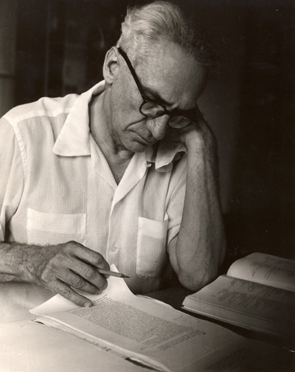Immanuel Velikovsky -
His Work

Through his work on psychoanalysis and especially on Freud's heroes Oedipus and Akhnaton, Immanuel Velikovksy got deeply involved in the study of ancient history and of the Near East in particular. On this occasion he came across an Egyptian papyrus which described events that were surprisingly similar to the book Exodus of the Old Testament.
Thus put on the scent, Velikovsky studied sources from all cultures around the Earth in a meticulous 10-year research project. Everywhere he found reports about great natural catastrophes impressing by their similarity and therefore giving rise to the assumption that there must have been dramatic events encompassing the entire globe.
This was in clear contradiction to the usual theory of uniformity according to which the state of the Earth today has been produced by a series of minute changes over very long periods of time, allowing only such processes as can also be observed today. But what was even more surprising was the dating of these catastrophes in historical times, when according to the generally accepted knowledge everything was quiet and normal.
At the same time as he found out about the global catastrophes, Velikovsky discovered that the generally accepted chronology of the history of Ancient Egypt was wrong by several centuries. In detailed research reminiscent of a criminological investigation he reconstructed the actual course of events and could find a simple and straightforward solution to many known inconsistencies.
In order to verify his findings from the study of ancient sources, Velikovsky also comprehensively dealt with geological, palaeontological and archaeological facts, which strangely enough from the point of view of the accepted teachings led to similar conclusions.
The unique feature of Velikovsky's approach was that he didn't try to interpret the traditional human testimony, nor to understand it in a metaphorical sense, but that he took it as literally as it had been written down.
This approach led him to an even more far-reaching conclusion about the cause of the described catastrophes. It appeared that the planets Venus and Mars played a crucial part in these natural events totally incompatible with their actual status as quiet neighbor planets of the Earth. The mythological and historical traditions of our ancestors described events in the sky that turn our entire concepts of the origin and history of our planetary system upside down.
Velikovsky was well aware of the importance of his findings and conclusions and only published elements that he could definitely prove, often by several independent indications. Nevertheless his first book Worlds in Collision caused an outcry among experts and the public alike that hadn't been seen in the history of science since the days of Galileo. After a partial prepublication, Macmillan, the publisher who was about to publish his book, was forced to cancel the project because of a joint blackmailing campaign by major American Universities. And even though the book later was on the top of national bestseller ratings for weeks and saw over 20 editions in the US alone, the resistance and uproar didn't die down until after Velikovsky's death.
The greatest stress in this campaign was caused by the personally slandering nature of most of the reproaches and discriminations, unworthy of any scientific approach and often made by persons who themselves hadn't even read Velikovsky's books.
On the other hand Velikovsky's theories also found enthusiastic, even exuberant supporters, and the result were vehement public controversies for several decades.
Velikovsky himself was interested in a serious, scientific (in the proper sense) discussion of his theories and made repeated efforts to initiate specific investigations, especially within the emerging space program, which however mostly were rejected. Nevertheless the explorations of Venus, Mars and also of Saturn and Jupiter by space probes brought about findings, which Velikovsky – based on his studies – had postulated already years before. At the time he had earned fierce derision for it, and now these confirmations were mostly dismissed as chance hits. Even since the 80s, when natural catastrophes became generally acknowledged as part of the history of the Earth, Velikovsky continues to be defamed or passed over in silence.
One of the few scientists that objectively and seriously dealt with Velikovsky's work was Albert Einstein. In the last 2 years of Einstein's life the two met regularly for scientific discussions and even developed a personal friendship. After Einstein's death Velikovsky's Worlds in Collision was found open on Einstein's desk.
In the last decades the general tactics of letting the grass grow over this unwelcome mind had an ever growing effect. For today's scientists the name "Velikovsky" mostly doesn't mean anything any more, even more so since hardly any encyclopedia makes any mention of him.
It appears all the more important that now his complete works are being published again. The publisher Paradigma Ltd. says that they have taken the task to make these works, which are so important for the way we see and understand ourselves, available for the public and for scientists, hoping that this will help to make them accessible for the serious and objective examination and assessment appropriate for them.